J. Gresham Machen Collection (7 vols.)
Digital Logos Edition
Overview
J. Gresham Machen is considered the last in the lineage of the Great Princeton Theologians, following in the steps of Archibald Alexander, Charles Hodge, A. A. Hodge, and B. B. Warfield. Machen taught at Princeton Seminary for almost 15 years and established himself as a well respected New Testament scholar. After a dispute that divided faculty members over an emerging modernist theology, Machen left Princeton and became one of the principal founders of Westminster Theological Seminary, where he taught until his death.
The works included in the J. Gresham Machen Collection (7 vols.) reflect his Calvinist views and reveal the depth and complexity of his thought. Included are Christianity and Liberalism and The Origin of Paul’s Religion, two important critiques of theological liberalism. God Transcendent and Other Sermons, edited by Ned Stonehouse, contains 20 of Machen’s best sermons. In What is Faith? Machen equates liberal theology with anti-intellectualism while illuminating the Bible’s teachings on the foundational tenets of the Christian faith.
Each volume in the J. Gresham Machen Collection (7 vols.) contains Machen’s engaging prose and insight. With the Logos Bible Software edition all Scripture passages in the J. Gresham Machen Collection (7 vols.) are tagged and appear on mouseover. This makes these resources more powerful and easier to access than ever before for scholarly work or personal Bible study. With the advanced search features of Logos Bible Software, you can perform powerful searches by topic or Scripture reference—finding, for example, every mention of “freedom” or “Acts 15:7–11.”

- Key works from J. Gresham Machen
- Important critiques of theological liberalism
- Completely searchable by topic or Scripture reference
- Title: J. Gresham Machen Collection
- Volumes: 7
- Pages: 1,484
This title is included in the following collections
You can save when you purchase this product as part of a collection.
2025 Reformed Diamond
$2,999.99$2,249.99Logos 7 Reformed Diamond Legac...
$2,999.99$2,999.992025 Reformed Portfolio
$4,749.99$3,562.49Logos 7 Reformed Portfolio Leg...
$4,749.99$4,749.99
- $11,399.99
- $23,999.99$17,999.99
- $21,749.99
- $24,999.99
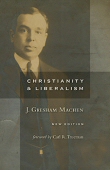
This classic defense of orthodox Christianity, written to counter the liberalism that arose in the early 1900s, establishes the importance of scriptural doctrine and contrasts the teachings of liberalism and orthodoxy on God and man, the Bible, Christ, salvation, and the church. J. Gresham Machen’s Christianity and Liberalism has remained relevant through the years ever since its original publication in 1923. It was named one of the top 100 books of the millennium by World magazine and one of the top 100 books of the twentieth century by Christianity Today.
An admirable book. For its acumen, for its saliency, and for its wit, this cool and stringent defense of orthodox Protestantism is, I think, the best popular argument produced [in the controversy between Christianity and liberalism].
—Walter Lippmann in A Preface to Morals
It is my conviction that Machen’s book can still speak today. . . . Even for those who do not agree with his central thesis, Christianity and Liberalism can still be understood as representing one of the literary artifacts of a generation that had come to see liberalism as leading inexorably to a sentimentalized religion that had nothing to do with the God of the Bible or, indeed, with real life.
—Carl R. Trueman (from the foreword), Westminster Theological Seminary
Christianity and Liberalism deserves a place on every thinking Christian’s shelf.
—Trevin Wax, managing editor of The Gospel Project at LifeWay Christian Resources and author of Counterfeit Gospels: Rediscovering the Good News in a World of False Hope
Frankly, it’s amazing to me how applicable this book is today. When we read a book about contentment or a book about putting sin to death, I expect it to remain applicable from generation to generation. But I am pleasantly surprised to find that this book, one written to battle theological error in a particular context, is equally applicable today.
—Tim Challies, blogger, author, www.discerningreader.com, Ontario, Canada
John Gresham Machen (1881–1937) was professor of New Testament at Princeton Seminary from 1915–1929. After a dispute against the emerging modernist theology at Princeton, Machen became one of the principal founders of Westminster Theological Seminary in Philadelphia, where he taught until his death. Machen is considered the last of the great Princeton Theologians (after Archibald Alexander, Charles Hodge, A. A. Hodge, and B. B. Warfield), and his works reflect their tradition of conservative, Calvinist orthodoxy.
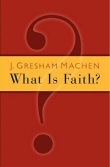
What Is Faith?
- Author: J. Gresham Machen
- Publisher: Eerdmans
- Publication Date: 1946
- Pages: 264
In this classic treatise first published in 1925, J. Gresham Machen explores biblical answers to this pivotal question. Lamenting the “false and disastrous opposition which has been set up between knowledge and faith” and continuing what was his long-running polemic against liberalism, Machen speaks out against halfhearted, watered-down attempts at faith that seek to engage the heart and the soul yet disregard the mind. He illuminates the Bible’s teaching on the foundational tenets of Christian faith, clearly demonstrating that it is knowledge—the intellectual pursuit and embrace of God the Father and Jesus Christ as revealed in Scripture—that forms the foundation of all true belief.
John Gresham Machen (1881–1937) was professor of New Testament at Princeton Seminary from 1915–1929. After a dispute against the emerging modernist theology at Princeton, Machen became one of the principal founders of Westminster Theological Seminary in Philadelphia, where he taught until his death. Machen is considered the last of the great Princeton Theologians (after Archibald Alexander, Charles Hodge, A. A. Hodge, and B. B. Warfield), and his works reflect their tradition of conservative, Calvinist orthodoxy.
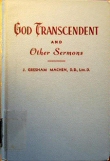
God Transcendent and Other Sermons
- Author: J. Gresham Machen
- Publisher: Eerdmans
- Publication Date: 1949
- Pages: 189
God Transcendent and Other Sermons contains 20 sermons, including the last one he preached just five days before his death. Sermons include “Prophets False and True,” “The Active Obedience of Christ,” “The Bible and the Cross,” and more.
John Gresham Machen (1881–1937) was professor of New Testament at Princeton Seminary from 1915–1929. After a dispute against the emerging modernist theology at Princeton, Machen became one of the principal founders of Westminster Theological Seminary in Philadelphia, where he taught until his death. Machen is considered the last of the great Princeton Theologians (after Archibald Alexander, Charles Hodge, A. A. Hodge, and B. B. Warfield), and his works reflect their tradition of conservative, Calvinist orthodoxy.
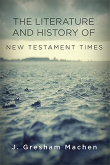
The Literature and History of New Testament Times comprises of 52 lessons, one for each week of the year, originally meant for the classroom. Published in 1915, The Literature and History of New Testament Times still serves as a quick and reliable reference guide for readers today, and each lesson is followed by a bibliography for further study on the chosen topic.
John Gresham Machen (1881–1937) was professor of New Testament at Princeton Seminary from 1915–1929. After a dispute against the emerging modernist theology at Princeton, Machen became one of the principal founders of Westminster Theological Seminary in Philadelphia, where he taught until his death. Machen is considered the last of the great Princeton Theologians (after Archibald Alexander, Charles Hodge, A. A. Hodge, and B. B. Warfield), and his works reflect their tradition of conservative, Calvinist orthodoxy.
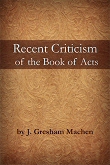
This essay on the authorship and literary unity of Acts originally appeared in the Princeton Theological Review.
John Gresham Machen (1881–1937) was professor of New Testament at Princeton Seminary from 1915–1929. After a dispute against the emerging modernist theology at Princeton, Machen became one of the principal founders of Westminster Theological Seminary in Philadelphia, where he taught until his death. Machen is considered the last of the great Princeton Theologians (after Archibald Alexander, Charles Hodge, A. A. Hodge, and B. B. Warfield), and his works reflect their tradition of conservative, Calvinist orthodoxy.
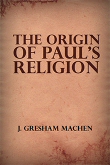
The Origin of Paul’s Religion consists of eight lectures on the history of Christianity that J. Gresham Machen delivered as part of the James Sprunt Lecture series at Union Theological Seminary in Virginia. Machen examines and refutes the modernist theories which denied Paul’s claim of the supernatural origin of his religion, and shows both by the witness of the opposers themselves, and by the Scriptures, that Paul’s own explanation is the only satisfactory one. “Explain the origin of the religion of Paul,” writes Machen in the Introduction, “and you have solved the problem of the origin of Christianity.” Contents include:
- Introduction
- The Early Years
- The Triumph of Gentile Freedom
- Paul and Jesus
- The Jewish Environment
- The Religion of the Hellenistic Age
- Redemption in Pagan Religion and in Paul
- The Lordship of Jesus
No device or dodge of the rationalist is suffered to go unchallenged. The whole battlefield of modern radicalism, so far as it concern’s Paul’s witness to Christ, is spread forth in this book, and the victory of faith is assured. Every minister should have this book, to read it, and then to read it again.
—The Union Seminary Review
Professor Machen has written a notable volume. Whether measured by literary standards or by standards of scholarship, it is a book to be reckoned with. With sound scholarship, broad sympathy, and clear insight, he has made more reasonable than ever the sense of certainty which the church has always cherished a respects the Apostle Paul.
—The Biblical Review
Professor Machen makes a notable contribution to a debate of the deepest interest in the field of New Testament study.
—The Homiletic Review
The Princeton professor shows clearly that the terminology of St. Paul’s writings, supported by St. Luke’s testimony in the Acts, admits of no sustained distinction between the redemptive conception of Christianity and the general teaching of the Apostle of the Gentiles.
—The Ecclesiastical Review
This book at once takes its place among the most important theological works of the day. It meets and overcomes the subjectivity and unhistorical position of modern works, and provides a perfectly reasonable and eminently satisfactory account of the great apostle and his presentation of the gospel of Christ.
—Bibliotheca Sacra
In an age when the nature and content of Paul’s message are once again under scrutiny, evangelical and Reformed readers will benefit immensely from a close reading of Machen’s masterwork. This book is an outstanding example of careful, patient scholarship that received high praise when it was first published and continues today to demand attention.
—R Scott Clark, professor of church history and historical theology, Westminster Theological Seminary, CA
J. Gresham Machen not only believed, practiced, and proclaimed Paul’s gospel, he was also able to defend its authenticity at the highest scholarly level. Because The Origin of Paul’s Religion penetrates to the heart of the matter it continues to speak to contemporary controversies over the nature of the gospel and the Christian faith.
—Sinclair Ferguson, professor of systematic theology, Westminster Theological Seminary, TX
John Gresham Machen (1881–1937) was professor of New Testament at Princeton Seminary from 1915–1929. After a dispute against the emerging modernist theology at Princeton, Machen became one of the principal founders of Westminster Theological Seminary in Philadelphia, where he taught until his death. Machen is considered the last of the great Princeton Theologians (after Archibald Alexander, Charles Hodge, A. A. Hodge, and B. B. Warfield), and his works reflect their tradition of conservative, Calvinist orthodoxy.
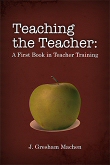
Written by four eminent scholars and Bible teachers, this book specializes on the history of God’s redeeming grace. It reviews Old Testament history, disclosing the stream of God’s redeeming purposes flowing down through ancient times. It reviews New Testament history, disclosing the broadening and deepening of that purpose for mankind in our Lord and Savior Jesus Christ and his church. It reviews the history of that church in the world. It introduces the student to the study of the human spirit, made in the likeness of God. It discusses the organization of the Church in order to carry out the Great Commission, particularly among the children and youth whose minds and hearts and consciences God has designed for that spiritual development which we call religious education.
Contents include:
- The Development of the Church in Old Testament Times, by James Oscar Boyd
- The Life of Christ and the Development of the Church in Apostolic Times and in Post Apostolic Times, by J. Gresham Machen
- An Introduction to the Study of the Mind, by Walter Scott Athearn
- The Church as a Teaching Institution, by Harold McAfee Robinson
John Gresham Machen (1881–1937) was professor of New Testament at Princeton Seminary from 1915–1929. After a dispute against the emerging modernist theology at Princeton, Machen became one of the principal founders of Westminster Theological Seminary in Philadelphia, where he taught until his death. Machen is considered the last of the great Princeton Theologians (after Archibald Alexander, Charles Hodge, A. A. Hodge, and B. B. Warfield), and his works reflect their tradition of conservative, Calvinist orthodoxy.
James Oscar Boyd (1874–1947) was assistant professor of Oriental and Old Testament literature at Princeton Theological Seminary. His numerous works include The Octateuch in Ethiopic According to the Text of the Paris Codex, The Documents of the Book of Ezra, The Historicity of Ezra, and A Brief Bible History: A Survey of the Old and New Testaments.
Walter Scott Athearn (1872–1934) received his bachelor’s degree of pedagogy from Drake University and was elected professor of grammar, physiology, and methods there. In 1916, he moved to Boston University where he taught for 13 years and served as dean of the School of Religious Education. Considered a pioneer in religious studies for higher education, Athearn also authored numerous works, including The Church School, The City Institute for Religious Teachers, The Organization and Administration of the Church School, A National System of Education, and The Minister and the Teacher: An Interpretation of Current Trends in Christian Education.
Harold McAfee Robinson (1881–1934) was Helen H. P. Manson Professor of Bible at Lafayette College in Easton, Pennsylvania. He authored numerous works, including The Secularization of Education in America, How to Conduct Family Worship, and Man: Slave or Free?
Reviews
9 ratings

Chris Gregory
12/17/2020
The value of them sold seperately is $75.50 The package deal is $90. Am I reading that right?Dr. Charles R. Nelson II
6/24/2018
These volumes are so enlightening. Machen was insightful and thought provoking. You can see today's cultural situation in his writings and there is a century between them. Read his works and see the solution today is the same as it was when he was fighting at Princeton.
Kevin Bratcher
6/12/2018

Jeff Miller
11/29/2017

Schamma
10/30/2014

David Leslie Bond
11/20/2013
Bobby Terhune
10/13/2013

James L
8/7/2013